
Thank you.
Your message has been sent and will receive a response.
Meanwhile, you can access
HunGar Book Galley
By clicking HERE.

As she plotteth revenge, the Cat Queene receiveth
a peace token from her Enemie.
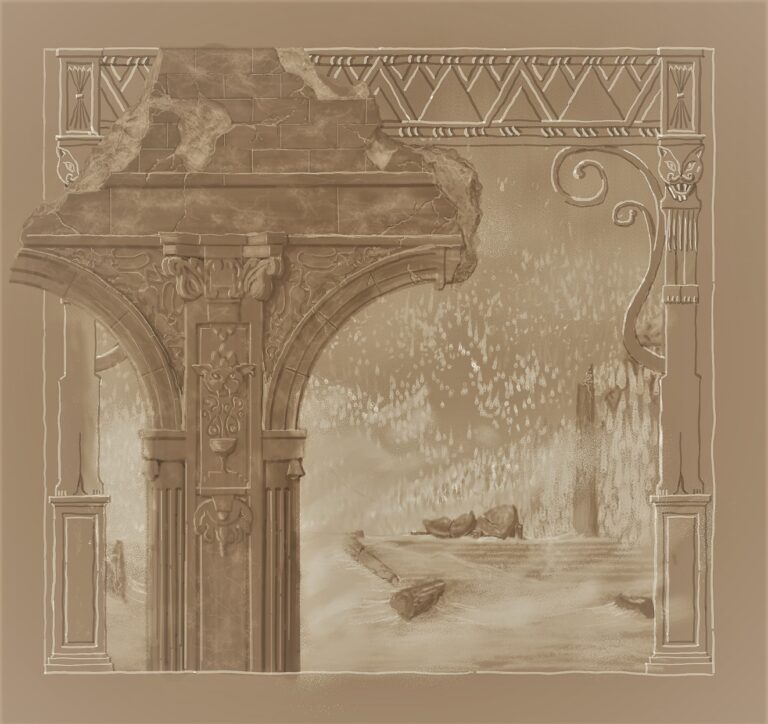
Threading a path through the broken rubble of the dead Goddess, powdered with snow, trod the Cat Queen, high in her mountain realm. Yonder starkly projected the stump of a column, and here lay on the flagged pavement, hoary with frost, a fragment of the divine sceptre. Strangely barren albeit were these ruins. The cataclysm had blasted most of the fabric instantly to atoms, swept clean away by the screaming night wind. Then for days the Cat Goddess had rained as a fine ash to coat the fronds of that tropical forest extending from the feet of the mountains. Katrina approached the high altar, cracked in two like an egg. Out of the colourless sky snow began to pelt again. The cruel wind dug through her fur with fingers of ice, while grain-sized flakes pecked her eyes and sensitive pink nose. There she stood, paws in freezing slush, gazing dully at that cloven altar top, still dark-stained from the bloody suppers of the Goddess. A flame of rancour combusted in the heart of that Queen. Into the hollowness of her despair was sucked a furnace blast of hot fury, driving from her all feeling of cold. Then with burning resentment she began to plot, and as she plotted her tail switched to life and weaved a maze in the air like the loose coils of smoke that presage the flame. The windings of her machinations ever returned to spiral round one obsession: How to turn tables by plucking from under the Rat King’s nose the two-faced magician, Alfred A. Brussel.
Thus her steward found her. He brought with him two bedraggled, travel-wearied arrivals: one, an hideous rodent with long yellow fangs, bearing a key; the other, a feline of her own realm, but of the abhorrent rats lately imprisoned. He, haggard and mangey, bore an iron box. These two envoies delivered also a message of the Rat King:
Judging the mightiness of a sovereign as more brilliantly illuminated by what he might give than by what he hath power to take, His Munificence, Othon XVIII., Head of all Rats on this side of the sea and Potentate of field mice and shrews, doth desire to offer His Peace to His vanquished Foe on most generous terms, and, in token of the Gentleness of His Heart, His Largesse the King Rat doth present to Her Majesty, Katrina, Queene of Cats, this small Box, the contents thereof, He doth satisfy Himself, She’ll find do measure in worth much bigger than size.
With curiosity she studied the bringers of this offering, so unlikely matched. ‘Most unnatural mating,’ she mewed, ‘howbeit cunning of the Rat. For, by this device hath he frustrated the natural coupling of male and female parts, thereby certifying delivery of the prize. Give thou unto me first the key.’ When she had the key about her neck upon its chain, she said, ‘Now, the box.’
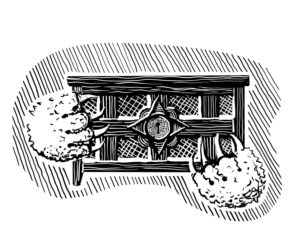
Then she dismissed all and betook herself to a closet high in her house, greedy to discover the contents of the box, but taking care first to bar the door. Windows in that high place did cast down stares upon her alpine realm, sentried all round by stern visages of granite, bearded with snow. Between those peaks long ribbons of valley streamed down to that forest ponderous with its shade, roiling to a far off azul mist that was the true sea. Hidden among the undulations of that sylvan province stretched vast marshes where the air swam with heat and monstrous insects. There, on an artificial archipelago, dwelt the rats in their teeming city wormed with canals and twisting alleys. When the wind came from that direction, cats said the stink was intolerable.
That view did not delight Her Majesty as it had formerly, when naught in it challenged her sovereignty, ere the Great Pyramid raised by the brazen rats gored her pride. So her visits to the room had grown infrequent, but now her eye did latch upon that rival mountain. Its shimmering slopes of gossamer melted into the air as it were of celestial frame. Night, the temple that crowned it, striding amongst the wheeling stars, made companion with the Moon, and sometimes caged it. Under its basement, thought she, were he prudent, the Rat would have sealed up its architect, Alfred A. Brussel. In the Rat’s place, it’s what she would have done. She considered, too, that, almighty as that many-storeyed mountain might seem from afar, yet was it built on plague, exhaustion, famine. It was built on the hollow bellies of rat children without strength to whimper for the food they lacked; on the rotting dead in the filthy alleys of the rat city, the quick too weak and too despairing to give burial to the heaped carcases. It was built on the hunger of Othon himself, the King Rat, if rumour be true that his cook made broths by boiling the stuffing from the palace mattresses. Once the girth of three common rodents, now, her spies reported, he lifted the draping mantle of his emptied skin like robes of state that he might walk.
So, as she steered her eye back to the peace offering, that she had set upon a shelf, her mind was bent not on peace, but destruction, for she thought: ‘Not clemency doth his gift betoken, but weakness. Some doubt concerning the invincibility of his God even now becloudeth the Rat’s heart.’ The resolve to exterminate the rodents, erase them forever, took shape within her and congealed like molten bronze. The fragrant smoke of their roasting flesh piled in heaps would rise even to the starry spirits, whilst the dripping grease would water the earth. Many mortal deaths would be traded for one divine and the Cat Goddess would again prowl the night, haunting the sleep of the rats. Her eyes blazed as if with the very flames that she envisioned and she spat with contempt at the paltry trinket box with which the dissembling Rat had sought to oil her submission. She savoured the haughtiness with which she would refuse the gift. She only wished she could be on hand to see the frustration on his face when the box was returned with her contemptuous retort.
Then it struck her that to disdain even to open it would be an insult still more delectable. With a voluptuous purr she turned her hindquarters to the box and padded from the room. Forthwith she made council with her generals, deliberating on the design meetest to capture the magician. Her generals regarded her bemusedly, for she did now and then treat herself to morsels of conceited smiles. They could not know that on those occasions she relished her proud rebuke of the Rat. Ever and again she mused on the treasure the box contained: What had he wagered could appease her? How keenly would he feel her refusal? When her generals had reverently taken her leave, having satisfied herself of possessing the will to put aside her curiosity, should it so please her, she judged she had, practically speaking, done so by proxy, wherefore she had no reason any more not to peek inside the box, which neither the Rat nor any one else need know.
She stole to the door of that upper room and slipped the key into its lock.
‘Your Majesty.’
She turned and saw her steward approaching. Guiltily she slid the key into her pocket.
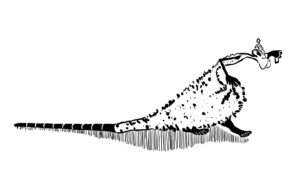

The nation of Ratona pleadeth succour of
the Rat God. The King diverteth his
mind from unease for his Son.
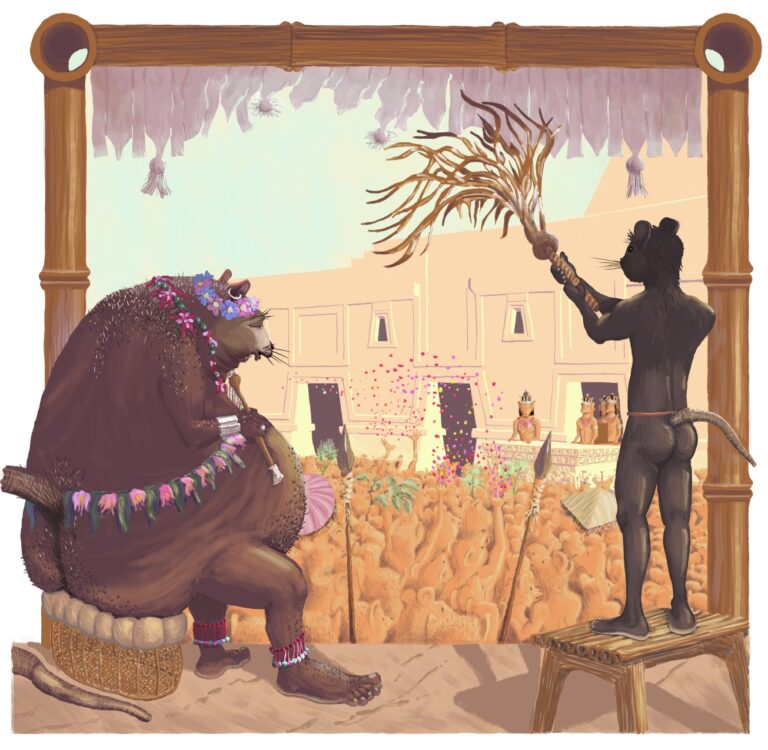
There never was a rat
That there wasn’t a cat
That wanted it dead.
Nor time when rat
Was fond of cat.
Like a round table
Where starts a fable
Without any head ?
. . . Before Katrina’s excellent view from her upper room was adulterated by that templed pyramid of the rats, when rats lived in dread of cats, in a season when a persistent arid wind off the mountains had delayed the rains, and the Barrier River had dwindled to a stream that even cats might ford with boldness. Every rat that could be spared was conscripted to patrol the bank. Rat wives fretted for the welfare of their husbands. They forbad their children to wander afar and at night tucked them into their own beds for fear of marauding cats’ bearing off their little ones. The marsh waters had sunk, robbing the capital of its natural defence. Temporary barricades were hastily put in place. Fosses were excavated. Vines were woven into nets and laid concealed in the parched marsh grass. Branches were gnawed into spears to construct palisades. Stores of victuals were also carried into the city against lengthy siege. The rats laboured without rest and with pressing speed, as they had not in many a year.
In the Plaza of the Fathers, in the heart of Ratona, the population had gathered to beseech the Rat God to sail home from his furlough across the sea on that marine wind that would bring the longed-for rain. In the crowds were some with baskets of petals with which they bejewelled the air with colourful sprays, whilst others sang hymns of praise to flatter and entice their God. To one side of the plaza under the shade of a thatched awning, upon his seat of lacquered and enamelled cedar, on a dais fenced with knights of the noble houses of his realm, sate the enormous Rat King, Othon XVIII, therefrom to preside over the ceremony.
Across the plaza facing the King stretched the long, stuccoed and many-doored Home Temple. Before it upon a platform bedecked with flowers grown in the temple gardens were assembled the priests, round that great altar whereon they had pinned a tiny robin by its wings, whom they had made pliant and sleepy with liquor of the barbel leaf. The incision was made, the little heart fluttered as the tiny life leaked out, the spirt of blood was caught in a dish of fired clay. They did divide the heart in pieces that they ate betwixt them. Then with the plaudits of Ratona the tiny corpse was ignited. With incense the priests did sow the little flame, making it to burst into red and yellow blooms that exhausted themselves in drifts of smoke. Thereafter with great pomp was the bowl borne to the King. The folk parted, made obeisance before the train, casting petals on the path.
The King received the cup. He wore a chain of flowers round his neck and festive flowers was he crowned withal. He squinted at the scanty sip of blood, frowned, and tutted. With despondent gesture he bade an ewer of water brought to augment the mite. Then he did take the mug in his two hands and took sip of the still-warm beverage. Thereafter with heavy tread he came down from his dais, depending on the arms of his attendants.
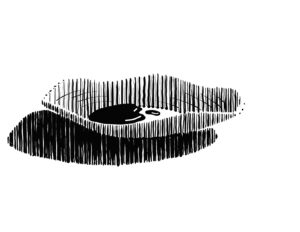
Bordering a side of the plaza was a building of austere mien with but one large opening in its wall, guarded by a thicket of iron bars. This was not the prison, but the seraglio of His Highness’s Harem. Many were the bosoms beating for love, like caged birds for air, pressed against the bars; lovely and liquid and long-lashed and longing were the eyes gazing out, more fascinated by the virile blades that numbered amongst the knights than by the spectacle of the ceremony. But where, the ladies asked one another, was the Prince Hranu himself, the King’s dashing firstborn, most eligible bachelor in all Ratland? Nahum was not there either, with eyes like the black pools where sweethearts might take a moonlit bath before conjugating upon the bank; nor hearty Astre with the elegant whiskers long as grass that he curled. The twain were ever at the young heir’s side. Grave and battle-seasoned Etiam was absent too; and Esan was not to be seen to-day in the plaza, sweet and beautiful as mortal boy scarce could be.
Othon XVIII bore the cup of blood to the temple. There was he divested of his flowers and fineries before he entered the chill gloom of the sacred vault, alone. With profound reverence he set the sacrifice at the feet of the stone Rat, muttering charms of invocation and supplication in the ancient, sacred rat tongue.
Blinking, temporarily blinded as he emerged into the bright sun, Othon XVIII dismissed the priests, seated himself in his palanquin and made his ceremonial exit.
In the palace forthwith he asked for tidings of his son. No word yet, he was told, from the river, of Hranu. The Prince and his hunting party had gone questing for more substantial fare to serve upon the city’s altar. Now they were many days absent. Briefly the King occupied himself with the business of the city’s defence, but found he had not heart for it to-day, vexed as he was by his son’s recalcitrance, recklessness and, perchance some ill hap befalling the Prince, uneasy too. Surrendering after little effort, he instructed his war council to continue without him, and betook himself to his bath, there to smoke sweet herbs and to have his cares massaged away by Mayte, a comely rat maid he much liked of present, and who, despite her recent arrival at court, was already expecting a litter of His Highness’s bastards.
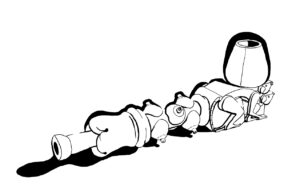

What ensued when Prince Hranu & the
fair Lords of Ratona adventured into Catland.
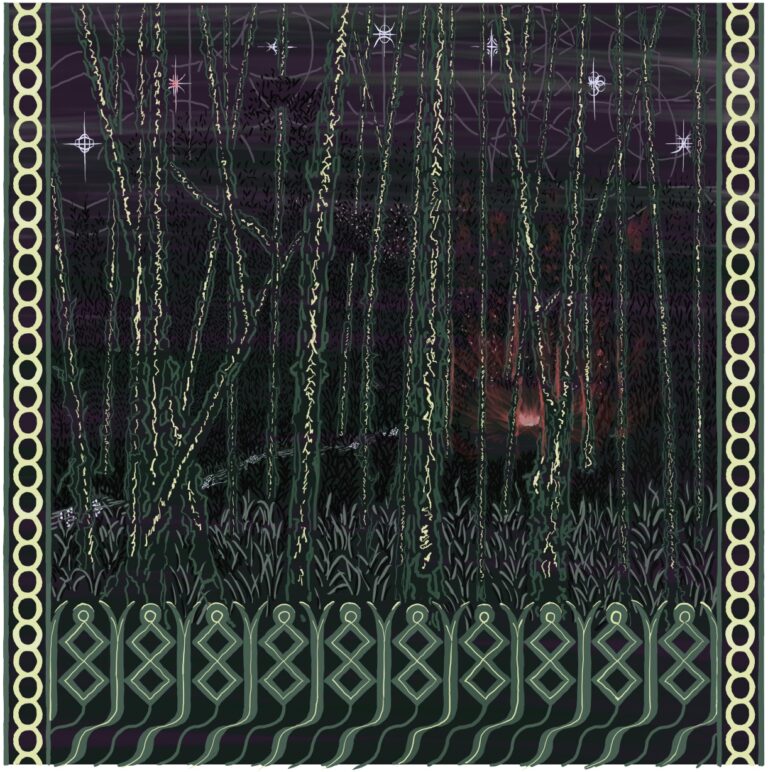
That night, Prince Hranu and the other young lords of Ratland that had adventured with him made camp by a small creek. The Barrier River was three days behind, for they had turned up one of its innumerable tributaries. They were now deep within the hostile territory of Kitania. About a cosy fire, snapping cheerfully, sate they upon the velvet moss warming their hands and feet, enjoying the deep night, crowned with the sumptuous diadem of the stars, but above all the good fellowship of each other that made the dangers hidden in the forest gloom seem trifling as child’s nightmare. A few worms tugged from the earth, fried up with a little fat, some tubers and some seasoning had feeded them well. Now they cupped from a bladder of scoot. Lord Etiam smoked his clay pipe whilst he listened, or perhaps did not, as Lord Nahum strummed upon his four-stringed lute and Lords Astre and Esan took turns to sing. Goodly voiced they were, but more sweetly tuned than Esan’s voice no harp could be. Freshest of those young lords, his companions regarded him as but a few summers removed from a bairn-in-arms.
Only Prince Hranu–slender built but well-knit was he and deceiving strong, this agilest of sworders—was not in humour. He poked savagely the fire with a stick, provoking it to flare indignantly and scold him with a chatter of sparks.
‘Ow!’ cried Astre sharply, drawing in his legs. ‘Thou hast singed my hairs, thou divel’s imp!’
As one sitting on an anthill up jumped the Prince and rebuked: ‘Mind thy rank, thy father’s bastard to a strumpet! Or take thee up thy blade that I might teach thee better manners!’
Then with equal hotness up jumpeth Astre and sayeth: ‘T’would do no honour to my metal to skewer a runt like thee, but I will pummel thy mug black and blue as delighteth thee.’
Then, Hranu, enraged: ‘Take thou the first swing, thou fairy-footed sister to thy half-brother!’
And Astre, that was so brawny of them he looked able to squish the Prince by the mere sitting on him: ‘Misses first, my dear, and after I have laid thee on the ground I’ll beat a merry tune from thee with the flat of my blade upon thy arse!’
With furious howl the Prince charged Astre, over-leaping the fire, but their fellows sprang up and tore them apart. By degrees they salved the adversaries’ indignation with soothing words, then did they chide the two when their hotness had abated, finally railed them mercilessly when they had got them back sitting on the ground.
It was want of sport that nettled the restive Princeling. Sourly he glared into the fire. ‘Three days have we been in this land of cats and not the whisker of a cat have we seen. Did they all grow wings and fly away?’
‘Patience, Prince,’ counselled Nahum. ‘We may scare up other game worthy of our home altar. Coon, for example.’
‘Coon!’ cried Esan, voice squeaking between relish and fear. ‘Are they not bigger than cats?’
‘Bah!’ said Hranu and spat. ‘It’s cat I want. The foe of rodents since time immemorial. It’s cat I came for! What song be more pleasing to our God than their yowling while barbequed alive in the holy flames? Too long has it been since that music tickled our ears, or that savoury aroma sweetened the air of Ratona.’
Etiam removed his pipe and knocked it on a rock. ‘Still, coon is the real trial of a warrior rat’s worth. Wild they are, not soft like so many of these house-broken pusses. They are not called hell cats lightly.’
‘Didst ever fight a coon, Lord Etiam?’ asked Esan eagerly. Etiam was twice in age, and to the Lord Esan the elder rat’s store of experience seemed exhaustless. On this occasion, however, Etiam shook his head. ‘Nay. Not I, ladling, but my father, he did. He earned a ragged scar for it, crooked as a forest path, down his side. Turned him inside out, the monster did, with one rake of his claws.’
‘A pass of one of their combs, sweet boy,’ cooed Astre, throwing a great forelimb about the young lord, ‘through thy silken hairs would filet thee into five ratlings.’ Then did he kiss affectionately the top of the lad’s head and playfully knock him over easily as a skittle.
‘ ‘Tis naught to make jest of,’ warned Etiam around the mouth-piece of his pipe, eyes burning through the veil of his smoke. ‘I’d sooner meet a she-bear in the wild than one of those demons, and ‘tis waterways like this where they are fond to lurk.’
Esan’s hairs springing stiff with alarm, he grew aware of all the shadows and dark hollows round them that might be hiding racoons. In the dense crisscross of limbs above he imagined a score of black shapes a-slinking. But Astre, his mirth rumbling deeply at Esan’s quailing, said: ‘Shiver not, ladling, we be here to protect thy hide. Neither is thy savoury rodent meat what sharpens the divel’s appetite, but chiefly fish he prefers.’ This, and the continued plucking of Nahum calmly upon his lute did reassure the boy as he hunched nearer the fire.
‘Bah!’ was what Hranu repeated to all this, spitting disgustedly. ‘They be but dumb, savage brutes in the end, whenas cats be armed and arrowed and armoured and trained in war art. Such are worthier opponents and be fitter game for the table of our awful God.’
Then the Lord Etiam laid down his pipe and said: ‘Hark, Prince, to my rede, if thou wilt hear it.’
‘Speak thy measure,’ quod the Prince Hranu.
‘This be it, that thou continue the following of this channel, but Nahum with his rats head up country east, by degrees bending his course back to the stream, whilst I fare west. In such wise we treble our chance of scaring some nest of felines. Meeting two days’ upstream, there will we concert our findings.’
All regarding this counsel of the Lord Etiam well-seasoned, they did so proceed on the morrow, and the Lord Astre and his followers did join with Etiam, but Prince Hranu unto Esan quod: ‘Thou, cousin, shall fetch with me for safekeeping, for reason that thou’rt son to my Uncle Thiel, who would not have granted thee leave to adventure on this faring, but thou naughtily stealed away. Wherefore I would keep thee under mine eye.’
To which Astre laughed heartily, saying: ‘Keep safe thy Lord Prince, ladling, and have care lest he catch his toe in a root and bash out the royal brains. Else to me thou’lt make answer!’ Lord Hranu answered with a lewd gesture, which made Astre only laugh the harder. ‘Now, Prince, what sayest thee to this wager, that losers play skivvies for a week for him who finds most success?’
‘It will pleasure me immeasurably to have thee, Fatty, filling my bath,’ returned the Prince Hranu. ‘Then ‘tis agreed,’ said the boisterous Astre, and raising his arm to salute, he bellowed, ‘Happy hunting, my warty lechers!’
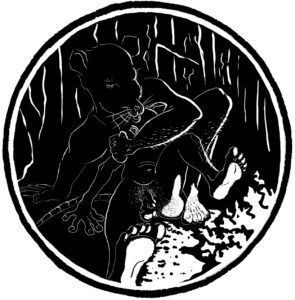

Your message has been sent and will receive a response.
Meanwhile, you can access
By clicking HERE.